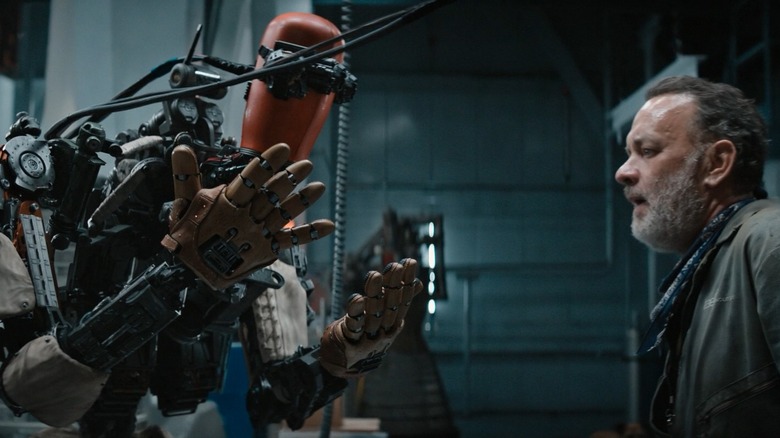An Underrated Tom Hanks Sci-Fi Movie Was Directed By A Game Of Thrones Veteran
Miguel Sapochnik's 2021 sci-fi film "Finch" has a heartbreaking premise. In it, Tom Hanks plays the title role, Finch Weinberg, a robotic engineer who is barely surviving the post-apocalypse. Most of Earth's surface has been rendered uninhabitable by a rogue solar flare, causing temperatures to skyrocket, and Finch has to survive in an underground bunker with only his beloved dog, Goodyear, as company. Finch is dying of radiation poisoning, and a storm is approaching — a storm that would wipe out him, his bunker, and Goodyear. In a hurry, Finch hastily constructs Jeff (Caleb Landry Jones), a humanoid robot capable of storing vast amounts of information. Finch, knowing his days are numbered, has to get in a protected bus and drive across the overheated wastelands to a safe city, training Jeff along the way how to behave like a human. More importantly, though, he has to train Jeff how to care for his beloved dog.
"Finch" was one of the many high-profile victims of COVID. The movie was initially called "BIOS," and was intended for release by Universal in the later months of 2020, but theater shutdowns forced it to be delayed several times. After the film had been delayed for nearly a year, Universal gave up on it, and Apple TV+ purchased it and retitled it to "Finch." The film was released exclusively on Apple on November 5, 2021, ensuring that it had $0 in box office receipts. 2021 was when Apple TV+ was still best-known for "Ted Lasso," prior to the debut of their ultra-hit "Severance." At the time, "Finch" was a flash in the pan.
It's a pity, really, because "Finch" is actually clever and moving. Hanks, as usual, gives an excellent performance, and Jeff is a fully realized sci-fi creature, dynamic in the same way as Data from "Star Trek: The Next Generation."
Finch is quite good, actually
The conceit of the Jeff character in "Finch" is that his brain is capable of holding a human brain's worth of information, but that he was unplugged when only about 7% of his data had been uploaded. As such, Jeff is a little childlike, and Finch has to find ways to teach him how to behave. Any and all sci-fi fans have likely constructed imaginary conversations in their brains about how they might explain basic human concepts to robots. How, for instance, would you explain a joke? Or what a dog might need? The visual effects on Jeff are astonishing, making him look articulate and real, even thought he was realized through CGI. One can also see why Finch has to keep his radiation sickness from Jeff. Death, it seems, is just too much to explain.
Critics were warm on "Finch," and the film has a 74% approval rating on Rotten Tomatoes, based on 172 reviews. The main critical complaints about "Finch" are mostly about its sentimental tone, and its lack of ethical discussion. Robert Abele of the Los Angeles Times said "Finch" felt like a discarded Pixar draft, but /Film's own Chris Evangelista noted that Hanks' heartfelt performance saved the movie. For a film that clearly had an enormous budget, it's odd how small and intimate it feels. A late-stage sequence in Death Valley is a highlight, as it allowed Hanks to dig deep into his character is small, subtle ways.
"Finch," as mentioned, was directed by Miguel Sapochnik, who has only directed two feature films to date: "Finch," and the sci-fi economic body horror thriller "Repo Men." He has also enjoyed a prolific TV directing career, helming episodes of hit shows like "House" and "Fringe." He also oversaw multiple episodes of "Game of Thrones," and served as co-showrunner for the first season of its follow-up series, "House of the Dragon." His work on "Game of Thrones" earned Sapochnik two Emmy nominations.
"Finch" and "Repo Men" are proof that he can handle high-profile sci-fi as well as prestige TV. His is a name we should all know.

